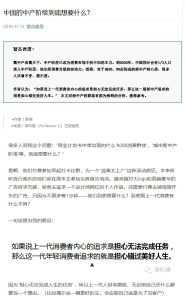Join getAbstract to access the summary!

Join getAbstract to access the summary!
Li Jing
What Does China’s Middle Class Want?
Aspirations and challenges of the new generations that make up this growing social class
Professor Li, 2016
What's inside?
What are the aspirations and challenges of China’s middle class, and how should companies tap this vast market?
Recommendation
Experts predict that by 2030, one-third of the Chinese population will be part of the middle class. Members of this group are determined to make the most of their lives. What will motivate them, and what challenges stand in their way? Li Jing, a former Baidu vice president and marketing expert now known as Professor Li, explores why the young people who make up China’s new middle class fail to live up to their own expectations. He also explains how businesses can take advantage of this group’s ambitions to tap this vast and growing market. getAbstract recommends Professor Li’s article to anyone interested in marketing, product design and consumer behavior.
Summary
About the Author
Li Jing is a former vice president of Baidu and a marketing consultant, who now runs the marketing- and strategy-focused WeChat wemedia account known as Professor Li.


















Comment on this summary